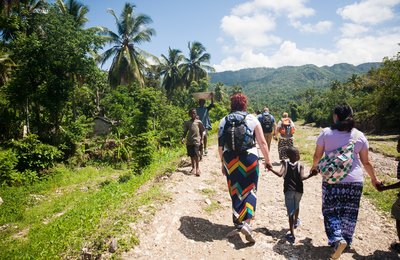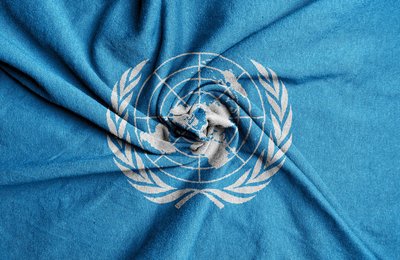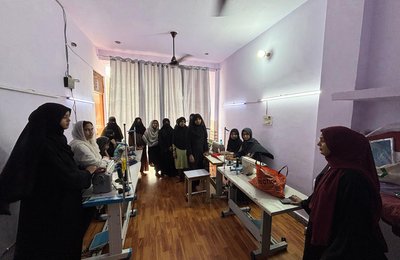Truth-telling against hate and misinformation in Ukraine
In this article, racial justice activist Alice Zhuravel shares her insights on combatting misconceptions about identity in Ukraine, helping to build social cohesion.
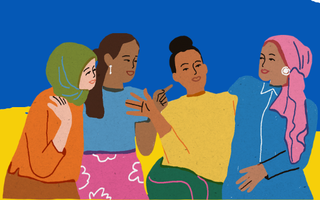
“It is crucial to reflect on one’s identity,” says Alice Zhuravel. “This helps you come to peace with oneself, and it also sheds more light on colonialism and how it’s been shifting people’s perceptions in the past.”
“When it comes to my identity, I’ve accepted myself fully,” she continues, “and I share testimonies of other diverse Ukrainians to amplify their voices and celebrate this diversity of my country.”
Alice Zhuravel is a racial justice activist from Ukraine. A historian by training, she long reflected on her identity as a Ukrainian of African background.
Even before Russia launched its full-scale invasion of Ukraine in 2022, it unveiled an extensive propaganda campaign that portrayed Ukraine as an extremely racist country. Russia-led narratives spread fake news on the radicalization of Ukrainian society to diminish support for the country, especially in the Global South.
Alice, having analysed this media messaging, decided to address the many misconceptions about her homeland – and showcase that Ukraine was diverse and multiethnic. She launched a digital platform Tozhsamist, or Identity in Ukrainian, which shares stories of Ukrainians of colour and analyses how Ukraine is redefining itself as a multicultural country with a complex history.
“People of all sorts of backgrounds identify as Ukrainians because they are born and live here,” Alice explains. “So I want to raise awareness on this, especially now, in the war context. I want to show the true Ukraine to the people who’ve never been here and showcase how the racist tropes about it are false.”
“My work is also helping Ukrainians rethink their identities and become more open to diversity in their communities,” she adds. “As these reflections continue, people are more welcoming and respectful toward others, regardless of their origins.”
Embracing oneself
Alice is from Kharkiv, Ukraine’s second-largest city, located only one hour away from the Russian border. Although her family comes from Nigeria, she’s never been there, spending her entire childhood in Ukraine.
“I identify myself as a Ukrainian with an African background,” Alice smiles, “I feel like this definition best describes me because I’ve never lived or experienced Nigeria, and I don’t speak the language.”
As a child, Alice didn’t encounter any racism, and she was treated the same way as kids. But she started noticing differences between herself and other children.
“I noticed how my classmates all had small braids while my hair was very different,” she recalls, “It made me want to be like everyone else because I didn’t like standing out.”
Back in the nineties, Ukraine lacked products for African hair, which made matters worse. So Alice relaxed her hair and tried to blend it as much as possible.
“If someone told me then that I’d be proudly wearing my Afro as an adult, I wouldn’t believe them,” she laughs.
Alice reconciled with her African identity growing up. She started listening to African musicians and reading about African cultures – and she embraced her own diversity.
“While I figured out my African side, I still struggled with my Ukrainian identity,” she continues. “I grew up in a predominantly Russian-speaking city, and I was a Russian speaker myself. I didn’t reflect on what it meant to be Ukrainian that much until 2014.”
But Russian aggression changed that. In 2014, Russia launched a smaller-scale war in Donbas, Eastern Ukraine, and annexed a Southern peninsula of Crimea. Eight years later, the war spread to the rest of Ukraine.
“I told my mom that if Russia were to do anything to our hometown, I’d stop using Russian completely,” Alice says, “So now, I’ve switched to Ukrainian completely, and I know many people like me.”
“I’ve also come to understand that it’s absolutely normal that people identify as Ukrainians even if they have different origins,” she adds, “And I am sharing stories about that.”
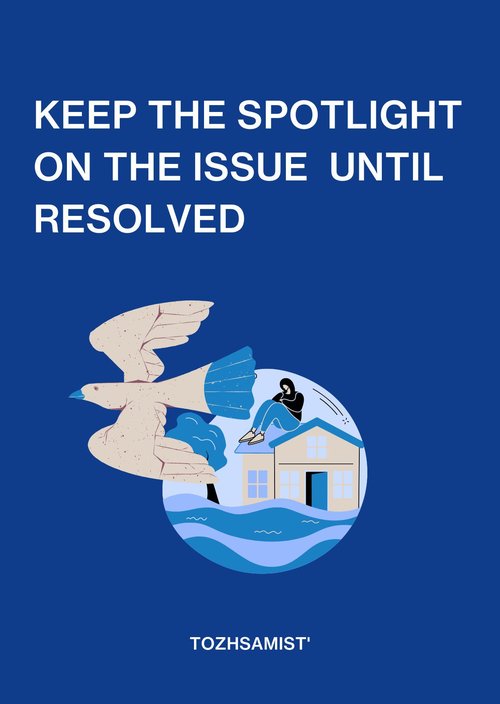
War, truth and race
The war displaced Alice: she had to leave her native city and now lives in Lviv, Western Ukraine.
“After the full-scale invasion happened, I started researching people’s experiences as they had to flee Ukraine and look for refuge abroad,” Alice explains, “I also study a lot of media narratives and information spaces.”
She realised, while Russia may be losing ground militarily, it was very successful in its information war. Thanks to Kremlin-backed narratives, the media space was filled with fake news and hateful messages about Ukraine.
“Russian propaganda spread a lot of misconceptions about Ukraine,” the activist highlights. “It exaggerated and invented a lot, and it made many people think of Ukraine as a very racist country. This is huge as these people may never visit Ukraine because of these beliefs, and it also diminishes support for Ukraine internationally.”
She decided to share her own experience as a Ukrainian of colour to counter the false narratives and support social cohesion. She also started collecting testimonies of other non-white Ukrainians – and this work transformed into her Identity project.
“On my platform, I talk about everyday experiences of people of colour in Ukraine without hiding or editing anything – so the aim is to portray Ukraine as it is,” Alice says. “The testimonies show the reality: while racism does exist in Ukraine as in any country of the world, it is not accepted by the entire population. Ukrainians don’t support individual acts of discrimination, more so systemic racism.”
She explains: as Ukraine has been a colony for most of its modern history, it lacks some of the ethnic diversity of its neighbours. Yet, independent Ukraine has been receiving a large influx of immigrants all the way until 2022, with nearly five million Ukrainians being foreign-born.
“Ukrainians know what it means to be colonised, given the country’s history,” Alice says. “So when non-white Ukrainians share their testimonies, it helps other Ukrainians to reflect on their own identities, too. I’ve received many messages from people telling me about their background and how they are now reflecting on identity in Ukraine, and how Russian colonialism affected them.”
“For example, we’re having discussions on how Russia used forced deportations and identity erasing during the Soviet times, and how this is repeated now,” she continues. “This helps us understand what’s been colonised and taken from us, and how the same methods are applied in 21 century to get rid of cultures and their representatives.”
Now, as a displaced person, Alice experiences even greater diversity in her home country – as Ukrainians from different regions are moving and finding themselves in new places.
“I’ve lived all over Ukraine, and I see how Ukrainians support one another in their identity journey,” she says, “People are rediscovering what it means to be Ukrainian by expanding this definition through their family histories. The self-reflection and truth help Ukrainians across the country embrace one another.”
“People of all sorts of backgrounds are now reaching out to me with their stories,” she concludes, “by reading about Ukrainians of colour, white Ukrainians are starting to dig deeper into their family histories, too. This helps them embrace the idea that Ukraine is home to all of us.”





